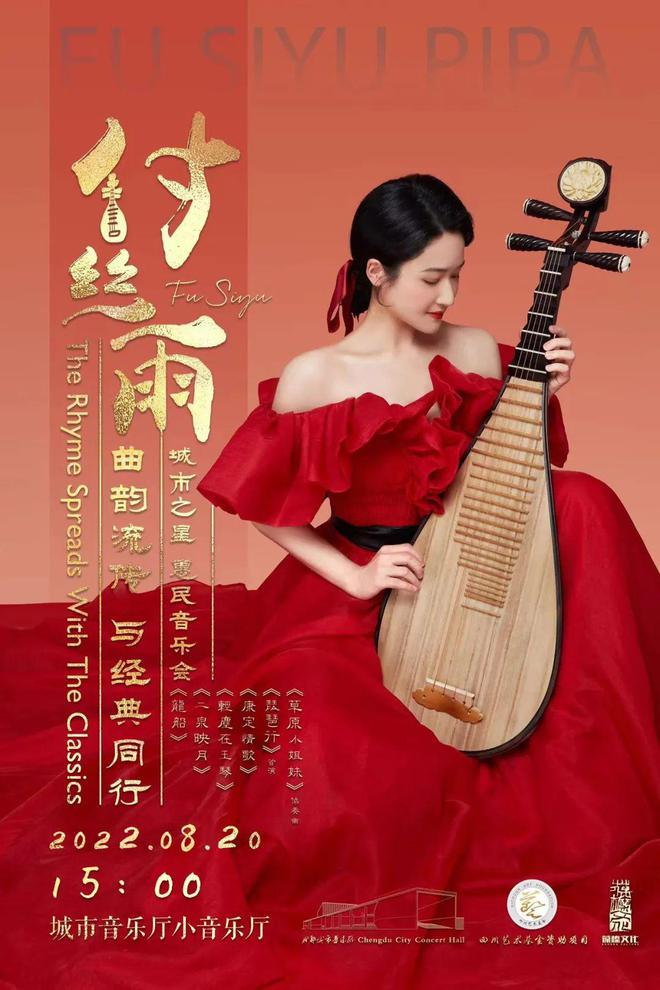Fu Siyu's "City Star" Huimin Concert "The Circulation of Quyi and the Classics"
On August 20, 2022, young pipa performer Fu Siyu joined hands with Baozhen Culture to select several classic pieces of pipa, and invite you to enjoy the beautiful melody like pearls falling on a jade plate. This concert includes both classic pipa repertoire and modern melodies adapted by the composer. While inheriting traditional music culture, it also gives new vitality to these works. Let's wait and see!

This concert is a 2021 Youth Year Artistic Talent Cultivation Funding Project of Sichuan Art Fund. The concert revolves around the theme of the times, mainly performing classic works and classic melodies. As a learner, lover, and inheritor of traditional Chinese culture, the main body of the project hopes to play these classic melodies again, combining some well-known and widely circulated classic music and Sichuan opera classics with strong regional flavors. The artistic style of the times is sorted or adapted, and the patriotism, innovation and exploration spirit, inheritance and development spirit of contemporary young people are reflected in their thoughts and actions with meager efforts.
repertoire
1. Pipa and Sichuan Opera "Dragon Boat"
folk music
Adapted by Hong Xiansong and Fu Siyu
"Dragon Boat" is a folk pipa solo big piece. The music material of the piece comes from the dragon boat race in the traditional Chinese festival Dragon Boat Festival. The piece imitates the sound of gongs and drums through special techniques and timbres, and the festive and lively scenes are carried out on the pipa instrument. A classic artistic rendition. Today, the classic gongs and drums of Sichuan Opera are added for adaptation, highlighting the lively and prosperous scenes in the music, integrating the charm of Sichuan Opera music, and playing old songs with new ones, so that the music can shine in a new performance form.
2. "Erquan Reflecting the Moon"
Hua Yanjun
Adapted by Li Jia
"Erquan Reflecting the Moon" is a classic Erhu piece and one of Mr. Hua Yanjun's famous representative works. Although there are many versions of this song, it is mainly synonymous with strings. Li Jia, a young teacher at the China Conservatory of Music, adapted it into a pipa version, interpreting the music with the unique timbre and techniques of the pipa. "Today, I dare to use the pipa to have fun, and I only hope that I can have a conversation with Erquan as A Bing does."
3. Pipa Duet "Light Dust in Jade Qin"
Qi Haodi
The name of the song comes from Nalan Rongruo's poem "Bodhisattva Man", "Xiaoxiao leaves with wind and rain, and it is more bitter to be apart from people's partial knowledge. It is more difficult to be apart from people. It is autumn when the toad falls. The night is cold and the quilt is thin, tears and lights fall. It is everywhere. Sad, light dust is on the jade piano." Le stands with "love", and love is named after "truth". The style of the song is gentle and delicate, clean and simple, like whispering in the ear.
4. "Kangding Love Song"
traditional folk song
Adapted by Qi Haodi
This is a traditional folk song circulated in the southwest of my country, also known as "Horse on the Mountain". This folk song expresses the passion of young men and women who love each other passionately and pursue a free and happy life. The melody is smooth, beautiful and deep. This piece was adapted by the young composer Qi Haodi into a national chamber music quartet. The work is fresh and elegant, with a distinct rhythm. It organically combines the characteristics of Chinese musical instruments with traditional local folk tunes, showing the unique charm and style of the western Sichuan plateau.
Intermission (10 minutes)
5. "Pipa Xing"
Li Tianxin Song (Premiere)
In the tenth year of Yuanhe, Bai Juyi was demoted to Jiujiang. On an autumn night, seeing off guests overflowing the Pu River, I heard the sound of the pipa in the boats beside the river. The Chang'an singer-songwriter came here, begging for her voice, and the whole audience was crying. Bai Ju easily felt that her life was desolate, and she was saddened by her own bad luck, saying "The same is the end of the world." people", pretending to be "Pipa Xing". This piece is composed by Bai Juyi's poetry.
6. Concerto "Little Sisters on the Prairie"
Wu Zuqiang, Wang Yanqiao, Liu Dehai
The piece was composed in 1973 and premiered in 1977 by the Central Orchestra. The pipa solo by Liu Dehai and the orchestra concerto set a precedent for the pipa concerto. The music describes the deeds of Mongolian girls Longmei and Yurong who fought against the blizzard to protect the collective sheep, showing the noble character and brave spirit of the new Chinese children who love the collective and are not afraid of the storm.
|Show time|
August 20, 2022 15:00
|Performance Location|
Chengdu City Music Hall · Small Concert Hall
 渝公网安备 50010702504639号
渝公网安备 50010702504639号